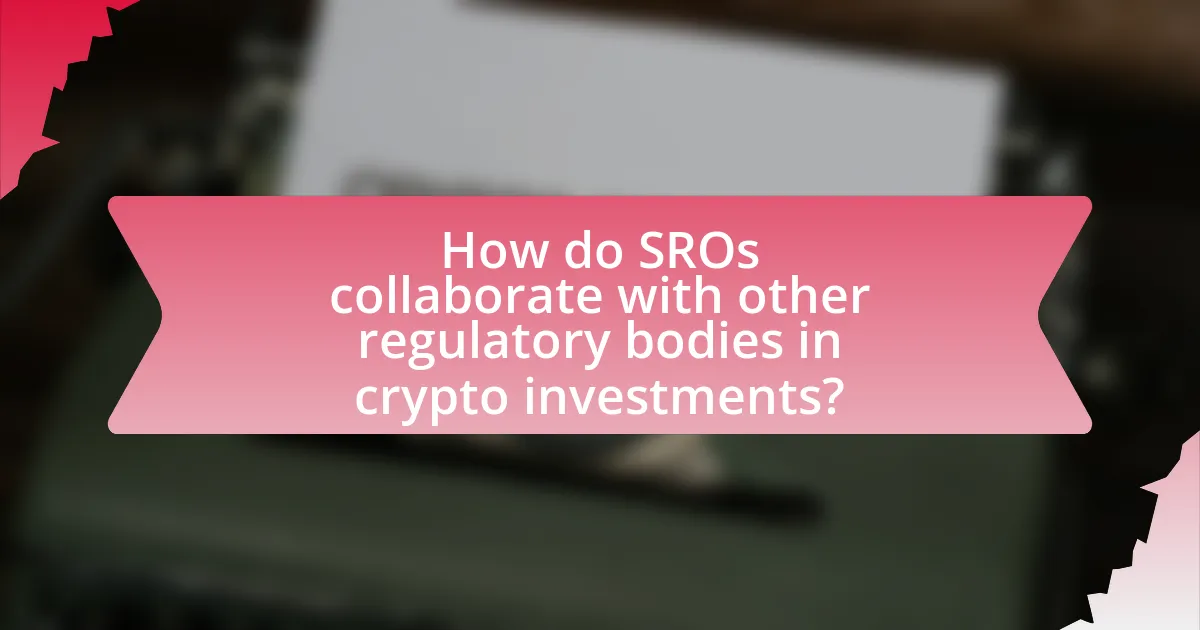Self-Regulatory Organizations (SROs) are non-governmental entities that establish and enforce regulations within the cryptocurrency investment sector to promote ethical practices and protect investors. This article examines the functions and key roles of SROs, such as the Financial Industry Regulatory Authority (FINRA) and the Blockchain Association, in enhancing transparency, ensuring compliance, and mitigating risks associated with fraud and market manipulation. It also addresses the challenges SROs face, including regulatory differences across jurisdictions and the rapid evolution of technology, while highlighting their importance in safeguarding investor interests and fostering trust in the crypto market. Additionally, the article discusses criticisms of SROs, their collaboration with government regulators, and practical steps investors can take to navigate the regulatory landscape effectively.
-in-the-context-of-crypto-investments-1.webp)
What are Self-Regulatory Organizations (SROs) in the context of crypto investments?
Self-Regulatory Organizations (SROs) in the context of crypto investments are non-governmental entities that create and enforce industry regulations and standards to promote ethical practices and protect investors. SROs, such as the Financial Industry Regulatory Authority (FINRA) and the Crypto Rating Council, aim to enhance transparency, reduce fraud, and ensure compliance with existing laws within the cryptocurrency market. Their role is crucial as they provide a framework for self-regulation, which can lead to increased trust among investors and greater legitimacy for the crypto industry.
How do SROs function within the cryptocurrency market?
Self-Regulatory Organizations (SROs) function within the cryptocurrency market by establishing guidelines and standards for market participants to promote transparency, integrity, and investor protection. SROs, such as the Financial Industry Regulatory Authority (FINRA) and the Blockchain Association, create rules that govern trading practices, enforce compliance among members, and provide educational resources to enhance market understanding. For instance, SROs may implement anti-money laundering (AML) and know-your-customer (KYC) regulations to mitigate risks associated with cryptocurrency transactions, thereby fostering a safer trading environment. This regulatory framework helps to build trust among investors and encourages broader adoption of cryptocurrencies.
What are the key roles of SROs in regulating crypto investments?
Self-Regulatory Organizations (SROs) play crucial roles in regulating crypto investments by establishing industry standards, promoting transparency, and enhancing investor protection. SROs create guidelines that govern trading practices and ensure compliance with legal requirements, which helps mitigate risks associated with fraud and market manipulation. For instance, organizations like the Financial Industry Regulatory Authority (FINRA) have developed rules specifically tailored for cryptocurrency transactions, thereby fostering a safer trading environment. Additionally, SROs often conduct audits and provide educational resources to both investors and market participants, further reinforcing their commitment to maintaining market integrity and consumer trust.
How do SROs ensure compliance among crypto investment firms?
Self-Regulatory Organizations (SROs) ensure compliance among crypto investment firms by establishing regulatory frameworks and guidelines that firms must adhere to. These frameworks typically include requirements for transparency, reporting, and operational standards, which help maintain market integrity and protect investors. For instance, SROs may mandate regular audits and compliance checks, ensuring that firms follow anti-money laundering (AML) and know-your-customer (KYC) regulations. Additionally, SROs often provide training and resources to help firms understand and implement these compliance measures effectively. This structured approach not only fosters a culture of accountability but also enhances investor confidence in the crypto market.
Why are SROs important for investor protection in crypto?
Self-Regulatory Organizations (SROs) are crucial for investor protection in crypto because they establish industry standards and enforce compliance among market participants. By creating a framework for best practices, SROs help mitigate risks associated with fraud, market manipulation, and lack of transparency, which are prevalent in the crypto space. For instance, SROs can implement rules that require member firms to disclose relevant information to investors, thereby enhancing market integrity and fostering trust. Additionally, SROs often provide mechanisms for dispute resolution, which can protect investors from unfair practices. This regulatory oversight is essential, as the crypto market is largely unregulated compared to traditional financial markets, making SROs a vital component in safeguarding investor interests.
What risks do investors face in the absence of SROs?
In the absence of Self-Regulatory Organizations (SROs), investors face significant risks including increased fraud, lack of transparency, and inadequate investor protection. Without SROs, there is a higher likelihood of scams and fraudulent schemes, as these organizations typically enforce standards and regulations that deter unethical practices. Additionally, the absence of oversight can lead to a lack of transparency in market operations, making it difficult for investors to obtain reliable information about the assets they are considering. Furthermore, without SROs, there are fewer mechanisms in place to resolve disputes or provide recourse for investors who may suffer losses, ultimately increasing their vulnerability in the market.
How do SROs enhance transparency in crypto investments?
Self-Regulatory Organizations (SROs) enhance transparency in crypto investments by establishing standardized practices and guidelines that promote accountability among market participants. These organizations implement rules that require disclosures related to trading activities, financial health, and operational practices of crypto firms, thereby ensuring that investors have access to critical information. For instance, SROs may mandate regular reporting of transaction volumes and compliance with anti-money laundering regulations, which helps to mitigate risks associated with fraud and market manipulation. By fostering a culture of transparency, SROs contribute to building trust in the crypto market, as evidenced by the increased participation of institutional investors who seek reliable and transparent investment environments.

What challenges do SROs face in the crypto investment landscape?
Self-Regulatory Organizations (SROs) face significant challenges in the crypto investment landscape, primarily due to the rapidly evolving regulatory environment and the inherent volatility of cryptocurrencies. The lack of a unified regulatory framework across jurisdictions complicates compliance efforts for SROs, as they must navigate differing laws and regulations while ensuring investor protection. Additionally, the decentralized nature of cryptocurrencies poses difficulties in monitoring and enforcing standards, making it challenging for SROs to maintain oversight and accountability. Furthermore, the prevalence of fraud and scams in the crypto space increases the risk for investors, placing additional pressure on SROs to implement effective measures to safeguard against such threats.
How do regulatory differences across jurisdictions impact SROs?
Regulatory differences across jurisdictions significantly impact Self-Regulatory Organizations (SROs) by creating varying compliance requirements and operational challenges. For instance, SROs in jurisdictions with stringent regulations may face higher operational costs and more complex compliance processes, which can hinder their ability to effectively oversee crypto investments. Conversely, SROs in less regulated environments may struggle with credibility and investor protection, as they may lack the necessary frameworks to enforce standards. This disparity can lead to inconsistent practices among SROs, affecting their effectiveness in promoting market integrity and investor confidence across different regions.
What are the implications of varying regulations on SRO effectiveness?
Varying regulations significantly impact the effectiveness of Self-Regulatory Organizations (SROs) in the crypto investment sector. When regulations differ across jurisdictions, SROs may struggle to enforce consistent standards, leading to gaps in investor protection and market integrity. For instance, in regions with stringent regulations, SROs can implement robust compliance measures, enhancing trust among investors. Conversely, in areas with lax regulations, SROs may face challenges in maintaining credibility and authority, as they cannot effectively oversee practices that could harm investors. This inconsistency can result in fragmented markets, where investors may be exposed to higher risks due to varying levels of oversight and enforcement.
How do SROs adapt to rapidly changing technology in crypto?
Self-Regulatory Organizations (SROs) adapt to rapidly changing technology in crypto by implementing flexible regulatory frameworks that can evolve with technological advancements. These organizations continuously monitor industry trends, engage with stakeholders, and conduct research to understand emerging technologies such as blockchain and decentralized finance. For instance, the Financial Industry Regulatory Authority (FINRA) has established guidelines for member firms to ensure compliance with new technologies, demonstrating a proactive approach to regulation. Additionally, SROs often collaborate with technology experts and industry participants to develop best practices, ensuring that their regulations remain relevant and effective in a fast-paced environment.
What are the criticisms of SROs in the crypto space?
Criticisms of Self-Regulatory Organizations (SROs) in the crypto space include concerns about their effectiveness, lack of authority, and potential conflicts of interest. Critics argue that SROs may not have sufficient power to enforce compliance among members, leading to inadequate consumer protection. Additionally, the voluntary nature of SRO membership can result in a lack of accountability, as non-compliant entities can easily opt out. Furthermore, there are worries that SROs may prioritize the interests of their members over those of investors, creating a conflict of interest that undermines their credibility. These criticisms highlight the challenges SROs face in establishing trust and ensuring robust regulatory frameworks in the rapidly evolving crypto market.
How do critics argue that SROs may hinder innovation?
Critics argue that Self-Regulatory Organizations (SROs) may hinder innovation by imposing rigid compliance requirements that stifle creativity and flexibility in the rapidly evolving crypto sector. These organizations often prioritize regulatory adherence over experimental approaches, which can limit the ability of startups to develop new technologies or business models. For instance, a report by the Blockchain Association highlights that excessive regulatory burdens can deter investment in innovative projects, as companies may focus more on meeting SRO standards than on advancing their products. This environment can lead to a slower pace of technological advancement and a reduction in the competitive edge of the industry.
What are the concerns regarding the accountability of SROs?
Concerns regarding the accountability of Self-Regulatory Organizations (SROs) include their lack of transparency, potential conflicts of interest, and insufficient enforcement mechanisms. SROs often operate with limited oversight from governmental bodies, which raises questions about their ability to effectively regulate and enforce compliance among their members. For instance, the Financial Industry Regulatory Authority (FINRA) has faced scrutiny for its ability to hold firms accountable, as evidenced by its limited disciplinary actions compared to the number of reported violations. Additionally, the dual role of SROs as both regulators and industry advocates can lead to biased decision-making, undermining their accountability. These factors contribute to skepticism about the effectiveness of SROs in maintaining fair practices within the crypto investment space.

How do SROs collaborate with other regulatory bodies in crypto investments?
Self-Regulatory Organizations (SROs) collaborate with other regulatory bodies in crypto investments by establishing frameworks for compliance, sharing information, and coordinating regulatory efforts. For instance, SROs often engage in dialogue with government agencies and international regulatory organizations to align standards and practices, ensuring that crypto markets operate within legal parameters. This collaboration is evidenced by initiatives such as the Financial Action Task Force (FATF) guidelines, which SROs adopt to enhance anti-money laundering (AML) and counter-terrorism financing (CTF) measures in the crypto sector. Additionally, SROs may participate in joint task forces or working groups that include representatives from various regulatory bodies, facilitating a unified approach to addressing challenges in the rapidly evolving crypto landscape.
What is the relationship between SROs and government regulators?
Self-Regulatory Organizations (SROs) operate in conjunction with government regulators to enhance oversight and compliance within the financial markets. SROs, such as the Financial Industry Regulatory Authority (FINRA) in the United States, establish rules and standards for their members, while government regulators, like the Securities and Exchange Commission (SEC), enforce federal securities laws. This relationship is characterized by collaboration, where SROs provide a framework for self-regulation that complements the regulatory authority of government entities, ensuring that market participants adhere to ethical practices and legal requirements. The effectiveness of this partnership is evident in the regulatory landscape, where SROs help to alleviate the burden on government regulators by monitoring compliance and addressing violations within their jurisdictions.
How do SROs complement the efforts of government agencies?
Self-Regulatory Organizations (SROs) complement the efforts of government agencies by providing industry-specific oversight and establishing standards that enhance regulatory compliance. SROs, such as the Financial Industry Regulatory Authority (FINRA) in the U.S., create rules tailored to the unique challenges of their sectors, which helps to fill gaps in government regulation. For instance, SROs can respond more swiftly to emerging issues in the crypto market, offering guidance and best practices that align with regulatory frameworks. This collaboration leads to a more robust regulatory environment, as evidenced by the increased transparency and accountability in financial markets where SROs operate, ultimately supporting government agencies in their mission to protect investors and maintain market integrity.
What role do SROs play in shaping regulatory frameworks for crypto?
Self-Regulatory Organizations (SROs) play a crucial role in shaping regulatory frameworks for cryptocurrency by establishing industry standards and best practices that enhance market integrity and consumer protection. SROs, such as the Financial Industry Regulatory Authority (FINRA) and the Blockchain Association, develop guidelines that help govern the behavior of market participants, thereby influencing regulatory approaches taken by governmental bodies. For instance, SROs often engage in dialogue with regulators to advocate for balanced regulations that foster innovation while ensuring compliance with existing laws. This collaborative effort can lead to more effective regulatory frameworks that address the unique challenges posed by the rapidly evolving crypto landscape.
How can SROs improve their effectiveness in the crypto market?
SROs can improve their effectiveness in the crypto market by establishing clear regulatory frameworks that enhance transparency and accountability among market participants. By implementing standardized reporting requirements and compliance protocols, SROs can ensure that crypto exchanges and related entities adhere to best practices, thereby reducing fraud and increasing investor confidence. For instance, the Financial Industry Regulatory Authority (FINRA) has successfully utilized similar measures in traditional finance, leading to a more stable market environment. Additionally, SROs can facilitate education and training programs for both investors and industry professionals, which can further promote informed decision-making and responsible trading practices.
What best practices can SROs adopt to enhance their regulatory role?
Self-Regulatory Organizations (SROs) can enhance their regulatory role by implementing transparency, establishing clear guidelines, and fostering collaboration with stakeholders. Transparency in operations allows SROs to build trust within the crypto community, as evidenced by the increased participation in regulatory frameworks when stakeholders understand the processes involved. Clear guidelines help define acceptable practices and standards, reducing ambiguity and ensuring compliance; for instance, the Financial Industry Regulatory Authority (FINRA) has successfully utilized such guidelines to regulate trading practices effectively. Collaboration with industry participants, regulators, and consumers can lead to more comprehensive regulatory approaches, as demonstrated by the successful partnerships formed in various sectors, which have resulted in improved compliance rates and better market integrity.
How can SROs engage with the crypto community for better outcomes?
SROs can engage with the crypto community for better outcomes by fostering open dialogue and collaboration through forums, workshops, and educational initiatives. These interactions allow SROs to understand the unique challenges and needs of the crypto community, which can lead to more effective regulatory frameworks. For instance, the Financial Industry Regulatory Authority (FINRA) has successfully hosted events that bring together industry stakeholders to discuss best practices and compliance issues, demonstrating the value of direct engagement. By actively participating in the community, SROs can build trust and enhance compliance, ultimately leading to a more stable and transparent crypto market.
What practical steps can investors take to navigate SROs in crypto investments?
Investors can navigate Self-Regulatory Organizations (SROs) in crypto investments by conducting thorough research on the specific SROs relevant to their investments. This includes understanding the regulatory framework, compliance requirements, and the specific guidelines set forth by these organizations. For instance, investors should familiarize themselves with the standards established by the Financial Industry Regulatory Authority (FINRA) or the Blockchain Association, which provide frameworks for ethical practices and investor protection in the crypto space. Additionally, engaging with educational resources and attending workshops or webinars hosted by these SROs can enhance investors’ understanding of compliance and best practices. By staying informed and actively participating in discussions around SRO regulations, investors can better navigate the complexities of crypto investments and mitigate risks associated with non-compliance.













